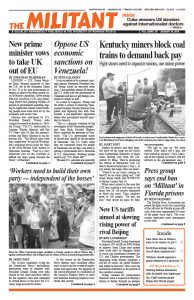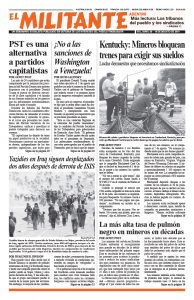In an escalation of its economic sanctions against Venezuela, President Donald Trump issued an executive order Aug. 5 that prohibits almost all remaining U.S. trade with the government of Venezuela and aims to get foreign companies to comply as well.
In a letter to Congress, Trump said the order is aimed at removing Venezuelan President Nicolás Maduro from power and replacing him with Juan Guaidó, a pro-imperialist opposition leader who proclaimed himself president in January.
“This is a flagrant violation of the sovereignty of the Venezuelan people,” said Amy Husk, Socialist Workers Party candidate for governor of Kentucky. “The U.S. government wants to decide who should be the president of Venezuela. The U.S. rulers claim they are concerned about the people of Venezuela, but all they care about is getting a government that is favorable to U.S. imperialism. Working people need to say, ‘U.S. hands off!’”
The new U.S. sanctions are especially aimed at foreign companies and governments — including in China, Russia, Turkey and India — that have continued to trade with the Venezuelan government despite Washington’s increasingly hostile measures.
The U.S. government had previously sanctioned more than 100 Venezuelan officials, confiscated Venezuelan government-owned Citgo’s assets and bank accounts in the U.S. and turned them over to supporters of Guaidó, and cut off most economic deals with state-owned Venezuelan oil company PDVSA. It backed a failed coup attempt by Guaidó in April and has tried to prevent Venezuela from sending oil to Cuba.
Governments of major European countries have joined with threats of imposing their own sanctions.
Washington’s escalating sanctions come amid negotiations taking place between representatives of the Venezuelan government and the opposition since May.
The embargo does not apply to the privately owned capitalist companies that account for most of Venezuela’s non-oil production. And Chevron — the last major US oil company still operating in Venezuela — and Halliburton, are exempt from the new rules until Oct. 25.
“We are sending a signal to third parties that want to do business with the Maduro regime: Proceed with caution,” National Security Adviser John Bolton warned in a speech in Peru to more than 50 governments aligned with Washington. “There is no need to risk your business interests with the United States.”
Washington says it will freeze the bank accounts and assets of any company it deems has violated the order.
With imperial arrogance, Bolton told the conference that an economic embargo “worked in Panama, it worked in Nicaragua once, and it will work there again; and it will work in Venezuela and Cuba!”
Bolton was referring to economic sanctions on Panama prior to the U.S. invasion in 1990 that overthrew Manuel Noriega; sanctions against Nicaragua after the 1979 revolution there, and Washington’s more than 60-year economic war against Cuba.
Maduro, like Hugo Chávez before him, has tried to administer and regulate the capitalist economy. But with a steep drop in oil prices and production it has become increasingly difficult to carry out the welfare programs established by the government.
The U.S. rulers hope that by increasing the suffering of Venezuela’s workers and farmers they can get rid of Maduro, and get a government more to their liking. A central objective of Washington’s strategy is to deal blows to Cuba’s socialist revolution and its solidarity with Venezuela and other countries in the region.
Washington’s sanctions had severely exacerbated the economic and social crisis working people face. Shortages of medicine, food and other basic necessities at prices working people can afford are widespread. Some 4 million have fled for Colombia and other neighboring countries.
Cuban Foreign Minister Bruno Rodríguez called the U.S. moves “another action to damage and rob” Venezuela.

